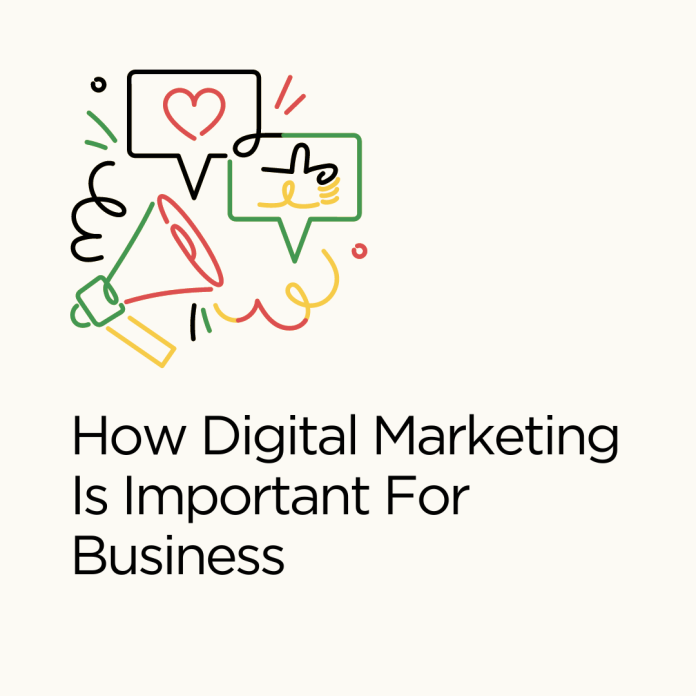In today’s digital age, where the internet has become an integral part of our daily lives, businesses need to adapt to the evolving landscape to stay relevant and competitive. Digital marketing has emerged as a powerful tool for businesses to connect with their target audience, drive sales, and foster brand loyalty. Let’s delve into why digital marketing is crucial for the success of any business.
Introduction to Digital Marketing
Digital marketing encompasses various online strategies and tactics aimed at promoting products or services through digital channels such as websites, search engines, social media, email, and mobile apps. Unlike traditional marketing methods, digital marketing allows businesses to reach a global audience instantaneously and measure the effectiveness of their campaigns in real-time.
Understanding the Importance of Digital Marketing for Businesses
Reach and Accessibility
One of the primary advantages of digital marketing is its ability to reach a vast audience regardless of geographical boundaries. Through channels like social media and search engines, businesses can connect with potential customers worldwide, breaking the barriers of traditional marketing.
Cost-Effectiveness
Compared to traditional marketing channels like print or television ads, digital marketing offers a more cost-effective solution for businesses, especially for small and medium enterprises with limited budgets. Online advertising platforms allow businesses to set their budgets and target specific demographics, ensuring optimal use of resources.
Targeted Marketing
Digital marketing enables businesses to target their marketing efforts towards specific demographics, interests, and behaviors. By analyzing user data and behavior, businesses can create personalized campaigns that resonate with their target audience, leading to higher conversion rates and ROI.
Data-Driven Strategies
One of the key advantages of digital marketing is the abundance of data available for analysis. Businesses can track and measure various metrics such as website traffic, engagement rates, and conversion rates, allowing them to refine their strategies for better results continuously.
Building Brand Awareness and Credibility
Digital marketing provides businesses with the platform to showcase their brand personality and values to a global audience. Through engaging content, social media interactions, and influencer collaborations, businesses can build trust and credibility with their target audience, leading to long-term brand loyalty.
Increasing Sales and Revenue
Digital marketing strategies such as search engine optimization (SEO), pay-per-click (PPC) advertising, and email marketing can significantly impact a business’s bottom line by driving qualified leads and conversions. By optimizing their online presence and targeting high-intent customers, businesses can increase sales and revenue consistently.
Engaging with Customers
In today’s hyper-connected world, customers expect personalized and seamless experiences from the brands they interact with. Digital marketing allows businesses to engage with their customers across various touchpoints, such as social media, email, and live chat, fostering meaningful relationships and driving customer loyalty.
Utilizing Various Digital Marketing Channels
Social Media Marketing
Platforms like Facebook, Instagram, Twitter, and LinkedIn offer businesses the opportunity to connect with their audience on a more personal level, share engaging content, and drive traffic to their websites.
Content Marketing
Creating valuable and relevant content not only attracts potential customers but also establishes businesses as thought leaders in their industry. Content marketing strategies such as blogging, video marketing, and podcasts can help businesses educate and entertain their audience while driving organic traffic and brand awareness.
Search Engine Optimization (SEO)
SEO plays a crucial role in improving a business’s visibility and ranking on search engine results pages (SERPs). By optimizing their website content, meta tags, and backlink profiles, businesses can increase their chances of appearing higher in search results, driving organic traffic and leads.
Email Marketing
Email marketing remains one of the most effective ways for businesses to nurture leads, promote products or services, and drive conversions. With the right segmentation and personalization, businesses can deliver targeted messages that resonate with their subscribers, leading to higher engagement and ROI.
Case Studies and Examples
Several businesses have successfully leveraged digital marketing to achieve their goals and overcome challenges. Case studies and examples provide valuable insights into the strategies and tactics that have worked for others, inspiring businesses to adopt similar approaches in their own marketing efforts.
Challenges and Solutions in Digital Marketing
While digital marketing offers numerous benefits, it also comes with its fair share of challenges, such as algorithm changes, platform saturation, and ad fatigue. By staying informed about industry trends and adopting a flexible and adaptive approach, businesses can overcome these challenges and stay ahead of the competition.
Future Trends in Digital Marketing
As technology continues to evolve, so do the trends in digital marketing. Emerging technologies such as artificial intelligence (AI), augmented reality (AR), and voice search are shaping the future of marketing, offering new opportunities for businesses to engage with their audience in innovative ways.
Conclusion
In conclusion, digital marketing has become an indispensable part of modern business strategy, offering unparalleled reach, targeting capabilities, and measurability. By leveraging the power of digital channels, businesses can build brand awareness, drive sales, and foster meaningful relationships with their customers, ultimately leading to long-term success.
FAQs
- Is digital marketing suitable for all types of businesses? Yes, digital marketing can be tailored to suit businesses of all sizes and industries. Whether you’re a small local business or a multinational corporation, digital marketing offers opportunities to connect with your target audience effectively.
- How long does it take to see results from digital marketing campaigns? The timeframe for seeing results from digital marketing campaigns can vary depending on various factors such as the industry, competition, and the chosen strategies. While some campaigns may yield immediate results, others may require time to gain momentum and show significant impact.
- What metrics should businesses track to measure the success of their digital marketing efforts? Businesses should track metrics such as website traffic, engagement rates, conversion rates, return on investment (ROI), and customer acquisition cost (CAC) to evaluate the effectiveness of their digital marketing campaigns and make data-driven decisions.
- How often should businesses update their digital marketing strategies? Digital marketing is a dynamic and ever-evolving field, so businesses should regularly review and update their strategies to adapt to changing trends, consumer behavior, and industry developments. It’s essential to stay agile and responsive to stay ahead of the competition.
- Can businesses handle digital marketing in-house, or should they outsource it to agencies? Whether to handle digital marketing in-house or outsource it to agencies depends on factors such as budget, expertise, and bandwidth. While some businesses may have the resources and capabilities to manage digital marketing internally, others may benefit from the specialized skills and resources offered by digital marketing agencies.



